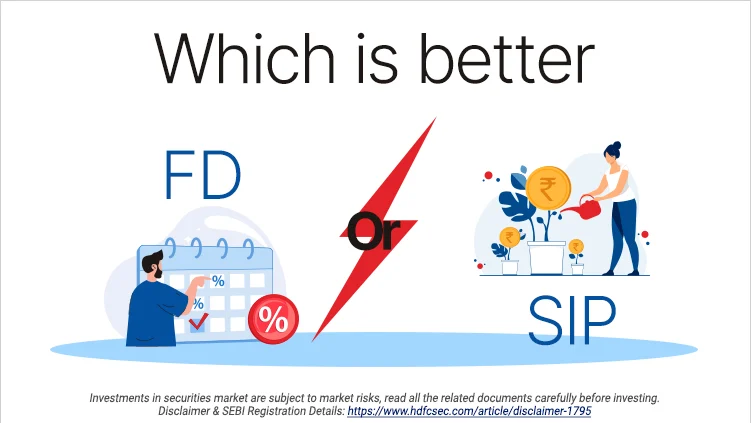Fixed deposits vs Mutual fund SIP’s

Choosing between Fixed Deposits (FDs) and Systematic Investment Plans (SIPs) in mutual funds depends on your financial goals, risk tolerance, and investment horizon. Both have their advantages, but they cater to different needs. Here’s a comparison to help you decide which is best for you:
Fixed Deposits (FDs):
Pros:
- Guaranteed Returns: Fixed deposits offer a fixed interest rate, so you know exactly how much you’ll earn by the end of the term.
- Low Risk: FDs are low-risk investments because they are backed by banks or financial institutions, offering principal protection.
- Liquidity: You can choose the tenure (short or long term), and some FDs allow premature withdrawals (with a penalty).
- Tax Benefit: Certain types of FDs (like tax-saving FDs) come with tax exemptions under Section 80C.
Cons:
- Lower Returns: FDs generally offer lower returns compared to equity investments, especially during times of inflation.
- Interest Taxation: The interest income from FDs is taxable according to your income tax slab.
- Inflation Risk: Over time, the returns from FDs may not outpace inflation, reducing the purchasing power of your money.
Systematic Investment Plan (SIP) in Mutual Funds:
Pros:
- Higher Potential Returns: SIPs in equity mutual funds have historically offered higher returns over the long term compared to FDs. The returns vary based on market performance, but they can significantly outpace inflation.
- Compounding Growth: SIPs encourage disciplined investing and benefit from the power of compounding, especially over long periods.
- Flexibility: You can choose the amount and frequency of your SIPs, allowing for flexibility in investment.
- Diversification: SIPs give you access to a diversified portfolio, which can reduce risk compared to investing in a single stock or asset.
- Tax Benefits: ELSS (Equity Linked Savings Scheme) mutual funds offer tax deductions under Section 80C, making them a good option for tax savings.
Cons:
- Market Risk: SIPs in equity funds are subject to market volatility, meaning the value of your investment can go up or down depending on market conditions.
- Long-Term Focus: To minimize risk, SIPs should ideally be a long-term investment (3-5 years or more). Short-term market fluctuations may affect returns.
- No Fixed Returns: Unlike FDs, SIPs do not guarantee returns. Past performance does not predict future returns, and you could lose money if the market underperforms.
Which Is Best for You?
- Choose Fixed Deposits if:
- You are risk-averse and prefer guaranteed returns.
- You need short-term parking of funds or are looking for a safe investment.
- You are seeking liquidity and tax-saving options without exposing yourself to market risk.
- Choose SIPs in Mutual Funds if:
- You are willing to take some level of risk for higher returns in the long term.
- You have a long-term horizon and can withstand market volatility.
- You want to build wealth through compounding and diversify your investments.
Conclusion:
- For safety and stability, Fixed Deposits are a solid choice, especially for short-term goals and risk-averse individuals.
- For higher returns and wealth creation over the long term, SIPs in mutual funds are a better option, but they come with market risk.
Ultimately, both can be part of a balanced portfolio depending on your financial goals, time horizon, and risk tolerance. You can even combine both, investing in FDs for safety and SIPs for growth.